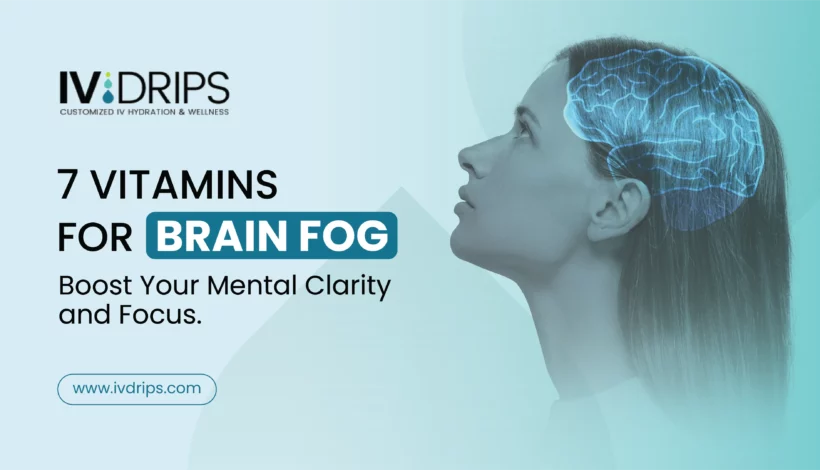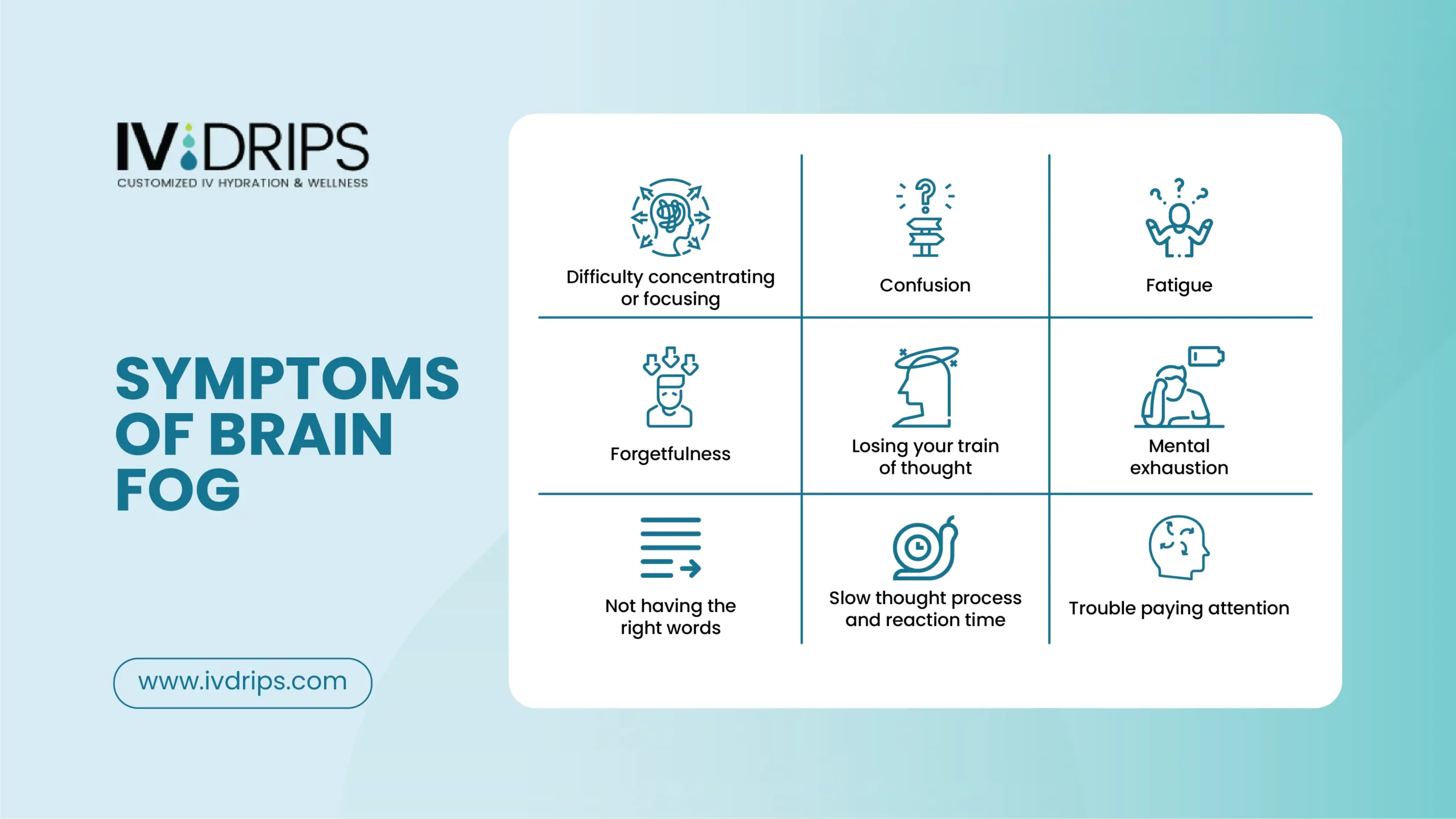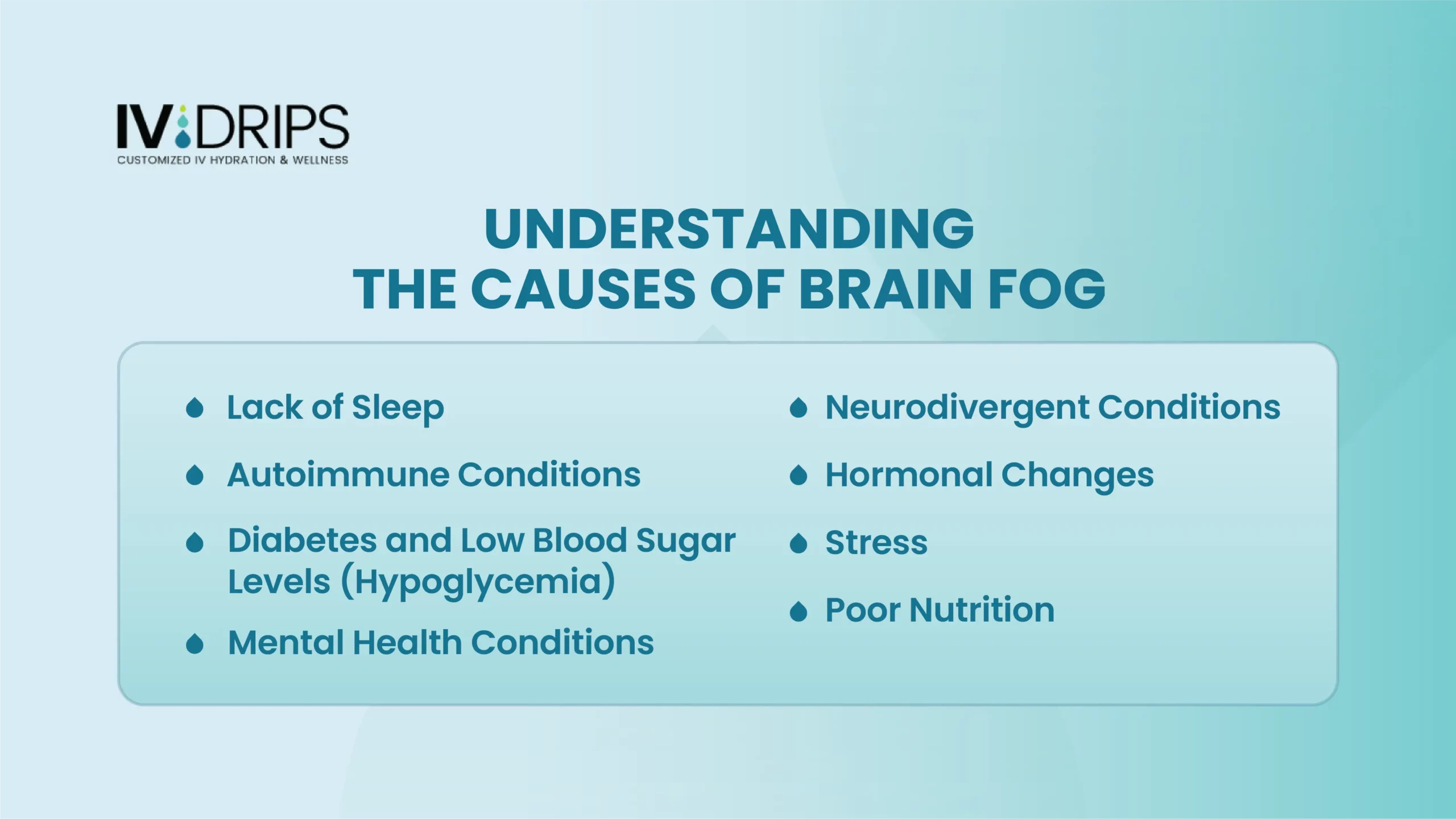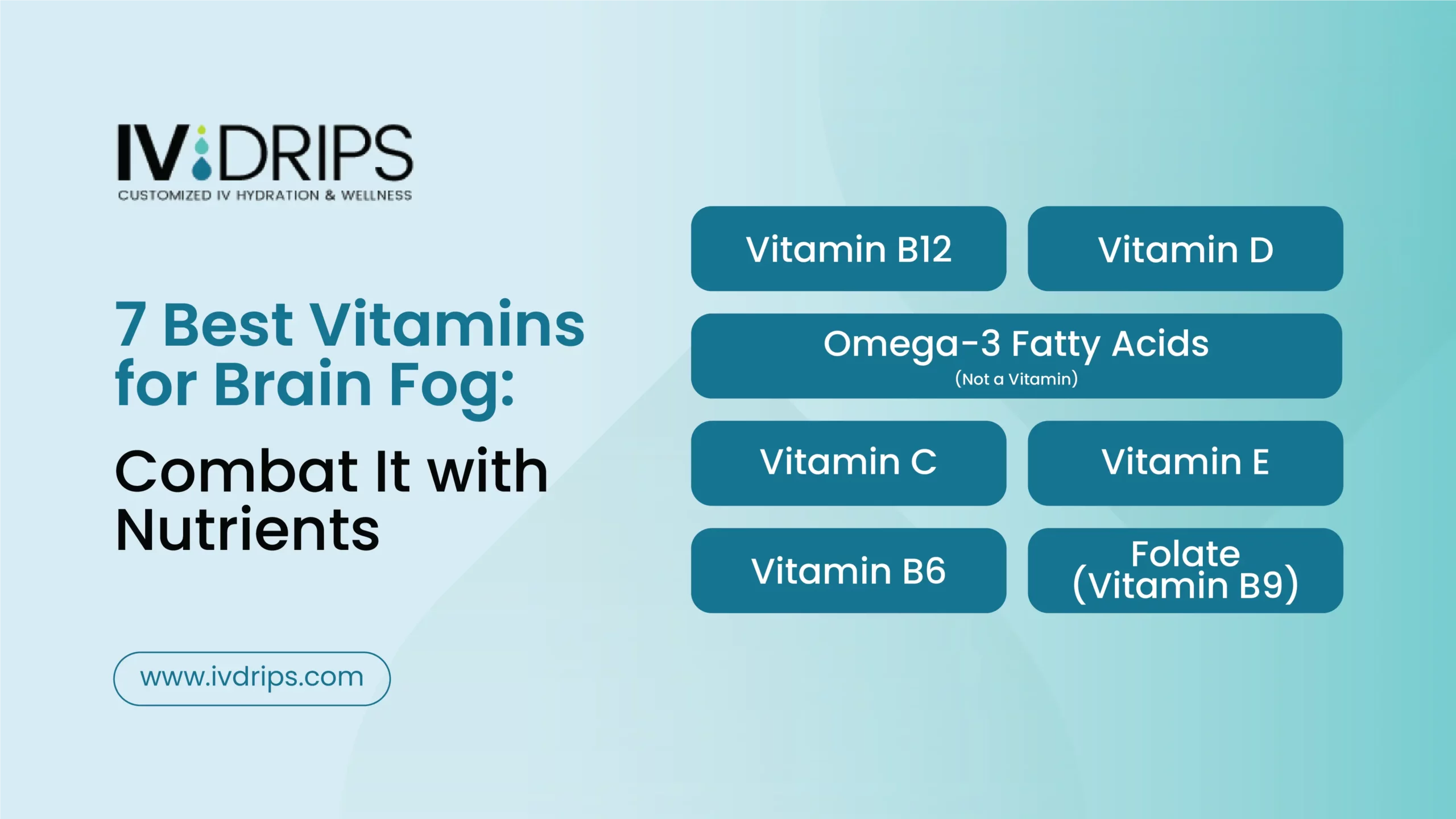
7 Vitamins for Brain Fog: Boost Your Mental Clarity and Focus
Have you ever found yourself mid-task, only to suddenly remember a completely unrelated chore you need to do? Or you’ve spent frustrating minutes trying to recall something you thought was simple. If this sounds familiar, you might be experiencing brain fog.
This blog post will dive into what causes this mental haze, how it affects you, and practical steps to clear the fog. Let’s get started.
What Is Brain Fog?
Brain fog is a common cognitive condition characterized by difficulties with thinking, remembering, and concentrating. When experiencing brain fog, individuals may struggle with coherent thought processes, find it challenging to focus, and experience frequent lapses in concentration. It’s important to note that these symptoms are temporary and can vary in severity from person to person.
Some of the symptoms of brain fog consist of:
- Difficulty concentrating or focusing
- Confusion and disorientation
- Fatigue and mental exhaustion
- Frequent forgetfulness
- Losing track of thoughts mid-sentence
- Challenges with finding the right words
- Slowed cognitive processing and reaction times
- Difficulty paying attention to tasks or conversations

Additionally, brain fog can manifest as a side effect of certain medications (like chemotherapy) or treatments, or it might be a symptom of an underlying medical condition.
Now, let’s discuss the possible causes.
Understanding the Causes of Brain Fog

Brain fog can be off-putting, affecting your ability to think, focus, and remember things. But what exactly causes this condition? Several underlying factors contribute to brain fog, including:
- Lack of Sleep: Poor sleep quality or insufficient rest can significantly impair cognitive function, leaving you feeling sluggish and unfocused.
- Autoimmune Conditions: Disorders like lupus, multiple sclerosis, and fibromyalgia can trigger brain fog due to chronic inflammation and immune system overactivity.
- Diabetes and Low Blood Sugar Levels (Hypoglycemia): Fluctuating blood sugar levels can disrupt brain function, leading to confusion and concentration difficulties.
- Mental Health Conditions: Anxiety and depression can cloud your thinking and make it difficult to concentrate, contributing to feelings of brain fog.
- Neurodivergent Conditions: Conditions like ADHD and autism spectrum disorder can affect cognitive processing, sometimes leading to challenges in focus and mental clarity.
- Hormonal Changes: Significant hormonal shifts, such as those experienced during pregnancy or menopause, can impact brain function and lead to foggy thinking.
- Stress: Chronic stress floods the body with cortisol, which can interfere with memory and cognitive function when levels remain elevated.
- Poor Nutrition: A diet lacking essential nutrients deprives your brain of the fuel to function optimally, contributing to mental fatigue and fog.
Having explored the potential causes of brain fog, you might be eager to understand how to combat it. While autoimmune conditions, diabetes, and neurodivergent disorders often require medical attention, factors like sleep deprivation, stress, and poor nutrition can be addressed through lifestyle changes.
Let’s look at how nutrition can contribute to brain fog and discover the role of vitamins in alleviating its symptoms.
How Vitamins Support Cognitive Function?
The search for solutions to brain fog often leads us to explore nutritional avenues. Just as certain health conditions can trigger mental fog, specific nutrients can help clear it. Vitamins are essential for optimal brain function. They support neurotransmitter production, reduce inflammation, and enhance blood flow to the brain – all crucial for mental clarity. By providing your brain with these vital building blocks, you can safeguard against factors contributing to brain fog.
Beyond general brain health, vitamins can directly combat brain fog symptoms. Incorporating critical vitamins into your diet can reduce the severity of brain fog, improve focus, and sharpen your mind. Vitamins can significantly impact your cognitive abilities by boosting energy levels, protecting neurons, or regulating mood.
The following section will explore which vitamins are crucial to supporting brain health and combating brain fog.
7 Best Vitamins for Brain Fog: Combat It with Nutrients

When it comes to improving mental clarity and reducing brain fog, specific vitamins play a pivotal role. These vitamins contribute to overall brain health by supporting neurotransmitter production, protecting neurons, and ensuring optimal energy levels. Let’s dive into each one and understand its function, sources, and recommended dosage:
1. Vitamin B12
Function: Vitamin B12 is one of the best vitamins for brain fog, as it’s crucial for energy production and maintaining the health of the nervous system. It helps form red blood cells and DNA synthesis and is essential for proper brain function. A B12 deficiency can lead to symptoms like fatigue, memory problems, and mood disturbances, which are common features of brain fog.
Sources: Rich sources of B12 include animal products such as meat (especially liver and beef), fish (like salmon and tuna), dairy products, and eggs. Fortified cereals and plant-based milks can also provide B12 for those on a plant-based diet.
2. Vitamin D
Function: Often referred to as the “sunshine vitamin,” Vitamin D plays a crucial role in regulating mood and supporting brain health. It aids in calcium absorption, which is vital for maintaining the health of neurons. Low levels of Vitamin D have been linked to depression, cognitive impairment, and overall mental fatigue.
Sources: The primary source of Vitamin D is sunlight. When exposed to UV rays, your skin synthesizes Vitamin D. Dietary sources include fatty fish (like salmon and mackerel), egg yolks, and fortified foods such as milk, orange juice, and cereals.
3. Omega-3 Fatty Acids (Not a Vitamin)
Function: Omega-3 fatty acids, particularly EPA and DHA, are crucial for brain structure and function. They are integral components of neuronal membranes and vital to cognitive function and mood regulation. Omega-3s reduce inflammation and support neurotransmitter activity, which can help alleviate brain fog symptoms.
Sources: Rich sources of Omega-3s include fatty fish like salmon, mackerel, and sardines, as well as plant-based sources like flaxseeds, chia seeds, walnuts, and algae-based supplements.
4. Vitamin C
Function: Vitamin C is a powerful antioxidant that protects the brain from oxidative stress, which can damage neurons and lead to cognitive decline. It also plays a role in neurotransmitter synthesis, particularly in the production of serotonin, which influences mood and mental clarity.
Sources: Common sources of Vitamin C include citrus fruits (like oranges and grapefruits), strawberries, bell peppers, broccoli, and Brussels sprouts.
5. Vitamin E
Function: Vitamin E is a potent antioxidant that protects brain cells from oxidative damage. It also helps maintain the health of cell membranes and supports overall cognitive function. Low levels of Vitamin E have been associated with memory loss and cognitive decline, making it an important nutrient for mental clarity.
Sources: Nuts (like almonds and hazelnuts), seeds (such as sunflower seeds), soybeans, spinach, and other leafy greens are excellent sources of Vitamin E.
6. Vitamin B6
Function: Vitamin B6 produces neurotransmitters like serotonin, dopamine, and GABA, which regulate mood and cognitive function. It also supports energy metabolism by helping the body convert food into glucose, giving the brain a steady energy supply. Deficiency in B6 can lead to confusion, depression, and weakened cognitive function.
Sources: Poultry (like chicken and turkey), bananas, potatoes, chickpeas, and fortified cereals are all excellent sources of Vitamin B6.
7. Folate (Vitamin B9)
Function: Folate, or Vitamin B9, is crucial for cognitive function and mental clarity. It plays a pivotal role in DNA synthesis and repair and the production of neurotransmitters. Folate deficiency can lead to mental fatigue, confusion, and even depression, all of which contribute to brain fog.
Sources: Folate is abundant in leafy green vegetables (like spinach and asparagus), legumes (such as lentils and chickpeas), beans, seafood, eggs, and fortified grains.
Incorporating these essential vitamins into your diet is crucial to combating brain fog and enhancing mental clarity. While dietary adjustments can significantly improve cognitive function, we understand the demands of modern life. Even maintaining consistent hydration can be a challenge. This is where IV drips emerge as a game-changer.
IV Drips: Nourish Your Body and Mind

Juggling work, appointments, and self-care can be overwhelming. Remembering to consume various vitamins daily might feel like an added burden. IV drips offer a convenient and effective solution. Bypassing the digestive system, they deliver nutrients directly into your bloodstream, ensuring optimal absorption and rapid results. We have a variety of pre-mixed concoctions of essential nutrients and vitamins, which are as follows:
- Hangover Drip
- Prenatal Drip
- Migraine Drip
- Food Poisoning Drip
- Hydration Drip
- Immunity Drip
- Energy Drip
- Detox Drip
Moreover, if you need a customized drip plan, we’re happy to help! Whether battling brain fog, seeking an energy boost, or aiming for overall wellness, our IV drips cater to all your needs.
Book your IV drip session today & experience a better, rejuvenated you!
Posted on behalf of IVDrips










